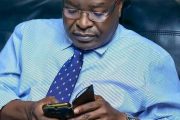Muhammadu Sanusi 11, the Emir of Kano’s inference about the Buhari regime ending up in the same unflattering and messy manner the Goodluck Jonathan regime ended has set tongues wagging about who could have helped the regime out if he or she had been involved. Informed consensus point at Dr Mahmud Tukur as the one with the clarity and audacity to have crafted another ‘counter-trade’ document, this time on devaluation which is at the centre of the crisis tearing apart the Buhari promise. The question is, where is Dr Tukur, the leading ideologue and Minister for Commerce in Buhari’s first coming in 1983?
His noted absence in the Buhari government this time has been puzzling to many who believe that this is the time of great need for highly sophisticated or original thinkers who can produce a sharper organising concept as opposed to the rather fragmentary and samey frameworks abroad so far. An observer compared his absence to that of a trained swimmer and saver who is, however, nowhere to be found in the wake of a massive flood in which people are drowning.
Generally considered too big to be ignored in a Buhari government, Dr Tukur has, however, been nowhere to be seen as such. There is a generalised belief that he would have been helpful in closing the gap in a Buhari who is neither a global mixer in Obasanjo’s manner or surrounded by crack intellectuals in the mould of IBB and certainly not tested in bureaucratic politics.

Quite a number of Tukur’s critics associate him with Sokoto Caliphate essentialism, partly because of his doctoral thesis which he reworked into the book, Leadership and Governance: The Relevance of Values but others note how his own junior brother, Mahmud Modibbo Tukur, the late Ahmadu Bello University, Zaria Historian, took a completely different position on the same Sokoto Caliphate in his own doctoral thesis, saying it was a mass uprising which, however, came in a religious garb.
It is also pointed out how his senior brother, Engineer Hamman Tukur, ran the Kaduna Polytechnic, the defunct National Electric Power Authority, (NEPA) and the Revenue Mobilisation and Fiscal Commission, (RMAFC), each in a manner considered to be most exemplary. Although conservative, Bamanga Tukur, another senior brother of his, has never been associated with Islamising Nigeria agenda as he went about his Africa Business Roundtable.
Instead of Sokoto Caliphate essentialism, many actually locate their assumptions about his utility in the current situation to a newspaper article he wrote during the June 12 crisis. The piece in question which he eventually had to advertise because The Guardian to which he wrote it as a rejoinder had reservations in publishing it was not on state, economy and society linkage but a few paragraphs there provided a powerful integration of the three variables in a way that punctured liberal political economy. Thus the felt absence of Dr Tukur has nothing to do with whether he is radical or conservative but simply that he is sufficiently self-confident as far as nationalist reading of economic management is concerned. Whether that self-confidence comes from Sokoto Caliphate or from the University of Pittsburgh in the United States where he earned his doctorate degree remains a debate.
It is not common knowledge what might have made him maintain a distance from the government or the government from him this time around. However, a number of people suggest that there is some distance between the two and everything does not seem to be well between the two.
Buhari’s performance is a cause for concern across the board because on informed and qualitative leadership rests national security when understood as popular satisfaction. Moreover, the region he is utilising its quota of rotation of power risks losing out in terms of resolving its most pressing problem the same way the south-south lost out under Goodluck Jonathan in terms of resolving that region’s oil related environmental anarchy. So, regime performance is not an issue that can be left for regime warriors, dancers and stilt men. While some people say that the regime has not been able to rise to the challenge of stellar performance because most of the players fear the president, others insist the problem of the government is the scarcity of men and women with barrier breaking thinking that can humanise power and governance. It is a debate Dr Mahmud Tukur is generally believed to be capable of deciding because, by age and previous relationship with the president, he can afford to be independent minded without such being misinterpreted as challenge to authority. And he can share competences with a few persons that are seen to have potentials in the regime, including the Vice-President. But, where is Mahmud Tukur?



























1 Comments
Mohammed Raji Bello
Dr Mahmud Modibbo Tukur is not a relation of Dr Mahmud Tukur. They only come from the same state, Adamawa. Engr Hamman Tukur is not an older brother to Dr Mahmud Tukur but a younger one.